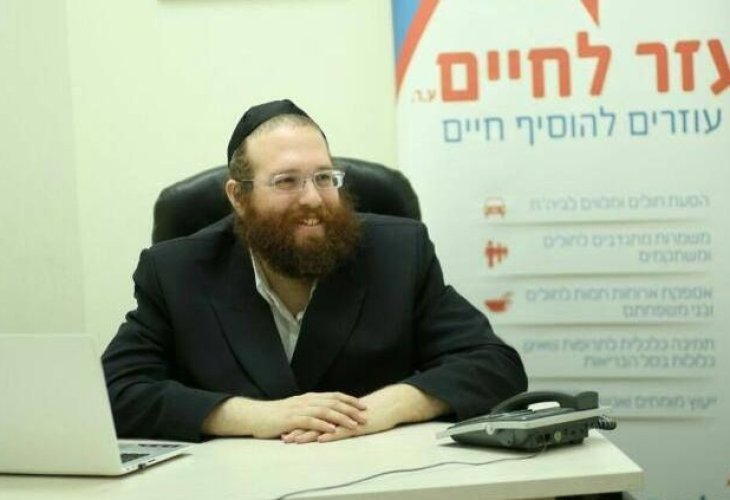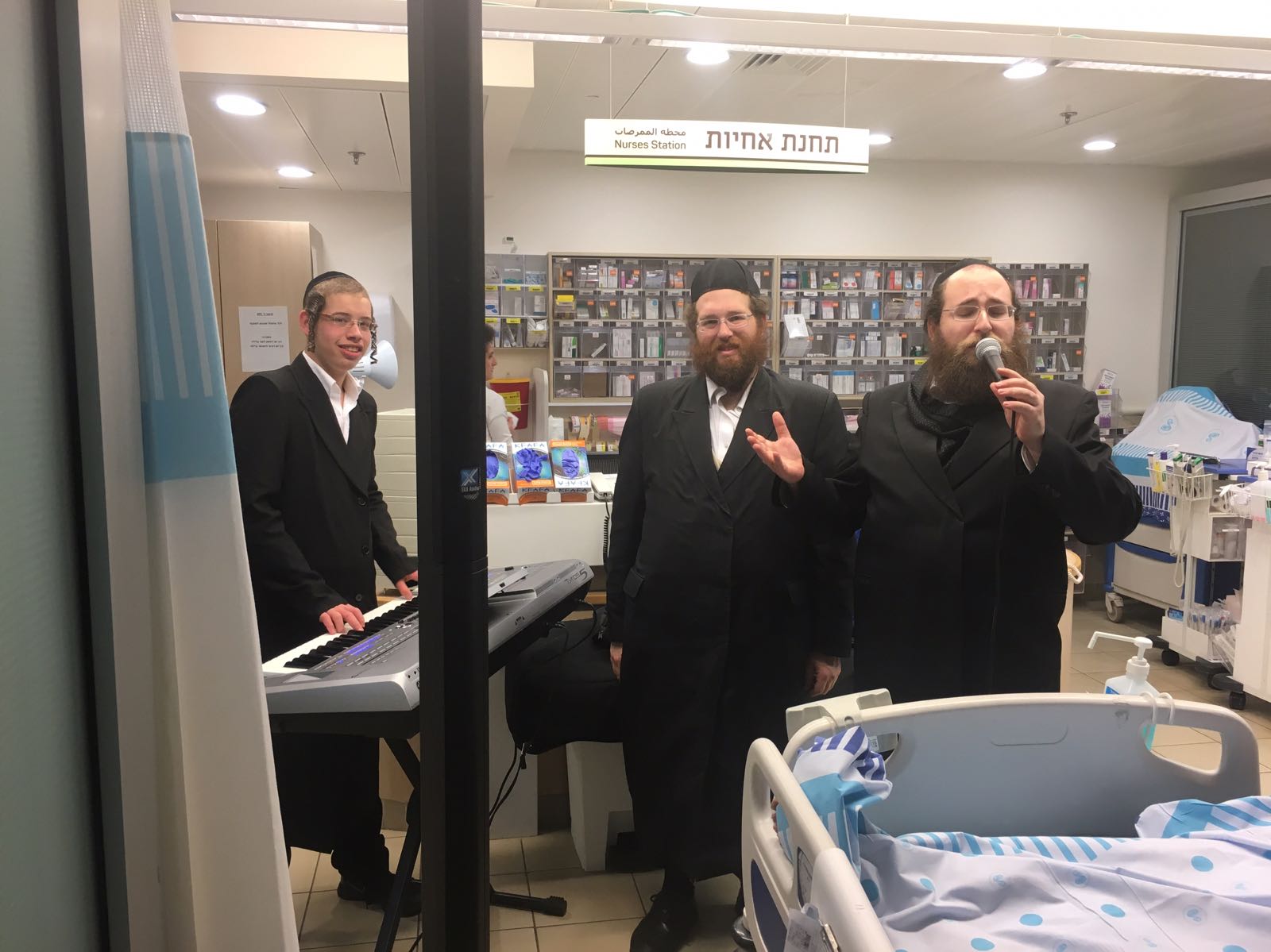"Driving a Patient to the Hospital is as Critical as Providing Medicine"
After his close friend was injured in a serious car accident, Nati Tzishinski became aware of the plight of hospital patients and their families. Five years after his spontaneous decision to organize volunteer drivers for hospital transport, a large charity organization has grown. Interview

When Nati Tzishinski answers the phone, it's hard to hear him. In the background, there's lively music and a cheerful yet noisy commotion. "I'm sorry," he apologizes. "I can't talk right now, we're at the hospital. Can we talk later?"
It's worth noting that the time is ten at night, a time when such places are usually quiet, especially in the oncology ward at Tel HaShomer. In a later interview with Tzishinski, he explains that the decision to bring volunteers to the ward was completely spontaneous.
"The time was nine at night, all of us after a long and exhausting workday," he recounts. "Suddenly, a father whose son is hospitalized in the oncology ward at Tel HaShomer called me. 'We've had a tough day. I haven't seen my son this downcast in a long time. Could you come over?' he asked. From there, I sent a message to our group. Within fifteen minutes, several volunteers arrived with an organ and light refreshments to lift the spirits in the ward. After we left, the father called to thank us. He said he hadn't seen his son smile like that in a long time."
When Nati Tzishinski began volunteering at hospitals, he didn't imagine that his innocent volunteer work would grow into such a large organization. His initial thought was to assist a close friend who was seriously injured in a car accident.
"When he was injured, he was hospitalized for a long period," he recounts. "He was a family man, a father of several small children, and it was a very difficult time for the family. We, the friends, took it upon ourselves to relieve some of the family's burden and stay by his side. As days passed, we saw that one of the family's biggest struggles was the repeated trips to the hospital. The reliance on buses that weren't always available and on taxis, which were very expensive, became a real nuisance. I started organizing a regular rotation of friends with cars to drive the family to and from the hospital. Later, when he was discharged and needed to come for check-ups, we continued the rotations. One day, while driving him, he told me that these rides were essential and very helpful. Then I thought: why not continue with the rides? Surely we can help other patients too."
That was five years ago. Tzishinski spread the word among his friends that volunteer drivers were needed for hospital transport. He says he himself was surprised by the overwhelming response. More and more drivers reached out, wanting to be part of the spontaneous initiative. In a short time, their numbers grew. Today, the "Ezer L'chaim" organization has 500 volunteer drivers, and Tzishinski says he aims to increase their number.

"Until You Experience it Yourself, You Can't Understand How Difficult the Struggle Is"
The daily presence alongside the patients and their families exposed the significant challenges they face. "I'll speak honestly," says Tzishinski. "I know we can't alleviate the illness itself, but we have committed to minimizing the surrounding pain and difficulty as much as possible. It's unbelievable how much a hot meal at home, where the mother is staying by her infant's side in the hospital, or a regular ride for a family with a hospitalized member, can ease the burden. Driving a patient to the hospital is a critical need, no less than providing them with medicine or volunteers to stay by their side."
How does the assistance you provide manifest?
"It started with rides to and from the hospital, continued with volunteers who came to bring joy to the hospitalized patients, and expanded to delivering hot, nutritious meals to families with a sick member. A large part of healing and the patient's mood depend on their feelings and state of mind, and we strive to bring happiness and ease as much as possible. We come with top musicians and artists and try to bring joy to the ward. On Purim, while most people were busy with delivering gifts and holiday meals, our volunteers went around hospitals from morning till night, aiming to uplift and bring joy to the hospitalized patients."
Don't most patients have family members to stay with them?
"That's precisely the point; until you experience it first-hand, you can't understand how difficult the struggle is. A mother approached us whose young son is hospitalized in a psychiatric ward. The family's struggle, just coordinating family members to visit him and caring for the children at home, is overwhelming. The assistance of volunteers to sit by the patient's bedside is essential. It's important for people to know that it is truly not okay to leave a patient alone because the treatment in hospitals is completely different if the staff sees someone by the patient's side taking care of them. It's a world of difference."
"Like a Drop in the Ocean"
The time spent alongside the patients, Tzishinski recounts, naturally led to an important additional focus for the organization, assistance with guidance and connection to doctors and professionals. "We have professionals who volunteer their time, without any compensation. Among them are psychologists, social workers, and psychiatrists. Anything that can help the patient and their family cope during this period and afterwards. Although there are many charity organizations doing holy work, unfortunately, it's like a drop in the ocean. It’s still not enough."
How are volunteers recruited to the organization?
"Our volunteers come from all walks of life. We have Chasidim, Lithuanians, members of the Sephardic communities, knitted kippa wearers, and many Jews with a good heart and a desire to help. Personally, every time I meet someone with a car, I ask them to donate a few hours to the organization. I can share a small story about one of our top volunteers, whom I met once on the street and convinced to do us a favor, to just take the phone calls. Today, he’s one of the most active drivers in the organization. He doesn't go to sleep without having made at least two trips to hospitals throughout the day. And we're talking about a father of a large family who also works full-time."
These daily hospital transports, Tzishinski explains, also have a significant impact on the volunteer drivers themselves. "It gives people perspective," he says. "Here’s a story that recently happened to one of our drivers. On the last day of Chanukah, a father of a sick girl, who sadly is no longer with us, called me and asked if it's possible to get an urgent ride to the hospital. The hour was one in the morning, and he apologized for the late hour, but he couldn't get a taxi and was used to our volunteers usually responding at any possible time. I sent a message to the organization’s group, and one of the volunteers confirmed he could take the trip. About an hour later, that volunteer called me and said: 'Nati, you changed my outlook on life.'
"It turns out that this volunteer was going through a tough time in life. He lost a large sum of money from an investment that didn’t succeed, faced issues with some of his children, and in general, was overwhelmed with troubles and worries. He told me that that night he couldn’t fall asleep due to gloomy thoughts, and thus immediately responded when the call came and volunteered to drive the father to the hospital. That short ride, he said, simply changed him. 'I thought I had troubles,’ he told me on that phone call. 'But after driving the father to the hospital, he asked if I’d be willing to wait a few minutes and take his wife back home. I had Moti Steinmetz's song playing in the car, turned up the volume, and waited for the mother to arrive. Then she came, sat in the back, and without saying a word, just started crying softly. I felt a shiver run down my spine. I thought I had troubles in life? That short ride completely changed my perspective; how much I need to be grateful for what I have.'"
However, despite the wide circle of volunteers, Tzishinski adds that the organization’s volunteers cannot keep up with the demand for assistance. "We are trying to recruit as many volunteer drivers to the organization," he says. "Because there are dozens of requests every day. It’s unbelievable how one can help people with just goodwill and a vehicle. It eases the families both economically and physically. These days we are launching a broad campaign to recruit drivers and volunteers in the Dan region to assist with transporting patients and their families to and from the hospital, as well as looking for volunteers who can sit by patients’ bedsides when needed. For the driver, it’s a matter of half an hour or an hour a day, and for the family, it’s salvation, truly so."

